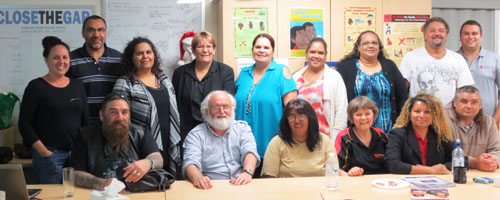AHCSA student research informs beyondblue comms strategy

Students studying for their Certificate IV in Indigenous Research Capacity Building (IRCB) at the Aboriginal Health Council of South Australia (AHCSA) completed a research project during 2012 that helped to inform mental health charity beyondblue’s communications strategy for improving mental health literacy in Aboriginal and Torres Strait Islander communities.
The project was the highlight of the year-long IRCB course with 12 students from Darwin, Adelaide and rural New South Wales and South Australia. The course, which is nationally accredited, was supported and part-funded by the Lowitja Institute together with Flinders University and James Cook University.
The students’ research focused on Aboriginal and Torres Strait Islander people’s perspectives on depression and anxiety. In order to collect the baseline data, students interviewed 13 Aboriginal people working in the health sector and then surveyed 75 people from their own communities, mostly in rural NSW, NT and SA.
The research showed that almost all the people interviewed or surveyed had personal knowledge of someone suffering from depression or anxiety and understood that these were serious conditions. Also, most people had some understanding of the causes, triggers, symptoms and long-term impacts of the conditions.
Of the 13 stories told by interviewees in the health sector, seven provided examples of people eventually overcoming their illness, despite some harrowing experiences. The common themes that ran through these success stories indicated that:
- Healing needs and takes time to occur.
- The person needs to acknowledge that they are not well
- Personal relationships which provide understanding and trust are of the utmost importance
- Self-help strategies can be effective in distracting people from their fears, e.g. going back to Country, getting exercise or keeping busy through pursuing study, housework or a job
- People need to take deliberate steps to shield themselves from negative impacts in their lives over which they have no control
- It may be helpful to work with a medical practitioner to find the right medication for a specific condition and physiology, or to be referred to a counsellor or psychotherapist.
The students identified a clear need for a communications strategy around depression and anxiety, and about how best to deal with these conditions in Aboriginal and Torres Strait Islander communities where cultural differences influence the kinds of programs that people are comfortable with. The research also highlighted an urgent need for more Aboriginal mental health workers, psychiatrists and psychologists, as well as professional development for GPs working with Aboriginal and Torres Strait Islander clients and their families.
The AHCSA Course Coordinator, Merridy Malin, said 2012 had been ‘a very rewarding year… with an inspiring group of students who supported each other and pursued the project with enthusiasm and competence’.
For more information visit the project page.

2012 graduates plus lecturers and support staff. Photo courtesy of AHCSA

